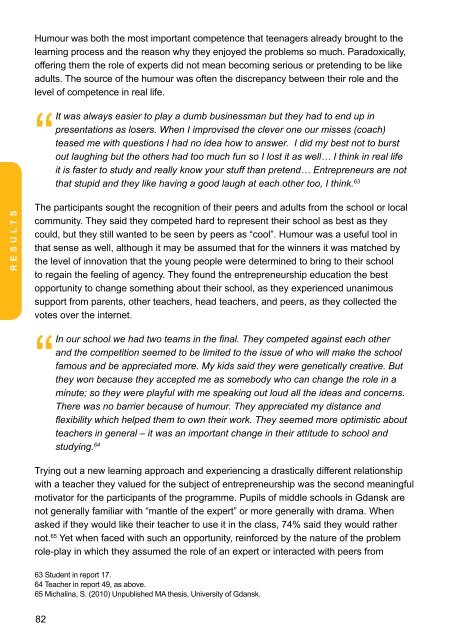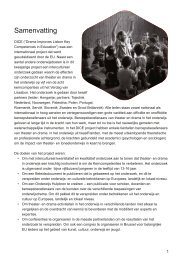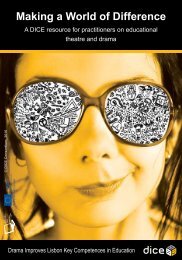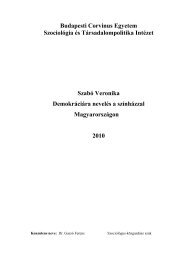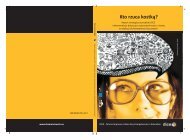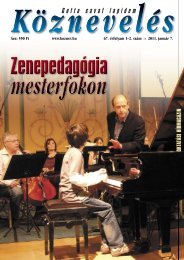Policy Paper - Drama Improves Lisbon Key Competences in Education
Policy Paper - Drama Improves Lisbon Key Competences in Education
Policy Paper - Drama Improves Lisbon Key Competences in Education
Create successful ePaper yourself
Turn your PDF publications into a flip-book with our unique Google optimized e-Paper software.
R e s u l t s<br />
Humour was both the most important competence that teenagers already brought to the<br />
learn<strong>in</strong>g process and the reason why they enjoyed the problems so much. Paradoxically,<br />
offer<strong>in</strong>g them the role of experts did not mean becom<strong>in</strong>g serious or pretend<strong>in</strong>g to be like<br />
adults. The source of the humour was often the discrepancy between their role and the<br />
level of competence <strong>in</strong> real life.<br />
“ “<br />
It was always easier to play a dumb bus<strong>in</strong>essman but they had to end up <strong>in</strong><br />
presentations as losers. When I improvised the clever one our misses (coach)<br />
teased me with questions I had no idea how to answer. I did my best not to burst<br />
out laugh<strong>in</strong>g but the others had too much fun so I lost it as well… I th<strong>in</strong>k <strong>in</strong> real life<br />
it is faster to study and really know your stuff than pretend… Entrepreneurs are not<br />
that stupid and they like hav<strong>in</strong>g a good laugh at each other too, I th<strong>in</strong>k. 63<br />
The participants sought the recognition of their peers and adults from the school or local<br />
community. They said they competed hard to represent their school as best as they<br />
could, but they still wanted to be seen by peers as “cool”. Humour was a useful tool <strong>in</strong><br />
that sense as well, although it may be assumed that for the w<strong>in</strong>ners it was matched by<br />
the level of <strong>in</strong>novation that the young people were determ<strong>in</strong>ed to br<strong>in</strong>g to their school<br />
to rega<strong>in</strong> the feel<strong>in</strong>g of agency. They found the entrepreneurship education the best<br />
opportunity to change someth<strong>in</strong>g about their school, as they experienced unanimous<br />
support from parents, other teachers, head teachers, and peers, as they collected the<br />
votes over the <strong>in</strong>ternet.<br />
“<br />
In our school we had two teams <strong>in</strong> the f<strong>in</strong>al. They competed aga<strong>in</strong>st each other<br />
and the competition seemed to be limited to the issue of who will make the school<br />
famous and be appreciated more. My kids said they were genetically creative. But<br />
they won because they accepted me as somebody who can change the role <strong>in</strong> a<br />
m<strong>in</strong>ute; so they were playful with me speak<strong>in</strong>g out loud all the ideas and concerns.<br />
There was no barrier because of humour. They appreciated my distance and<br />
flexibility which helped them to own their work. They seemed more optimistic about<br />
teachers <strong>in</strong> general – it was an important change <strong>in</strong> their attitude to school and<br />
study<strong>in</strong>g. 64<br />
Try<strong>in</strong>g out a new learn<strong>in</strong>g approach and experienc<strong>in</strong>g a drastically different relationship<br />
with a teacher they valued for the subject of entrepreneurship was the second mean<strong>in</strong>gful<br />
motivator for the participants of the programme. Pupils of middle schools <strong>in</strong> Gdansk are<br />
not generally familiar with “mantle of the expert” or more generally with drama. When<br />
asked if they would like their teacher to use it <strong>in</strong> the class, 74% said they would rather<br />
not. 65 Yet when faced with such an opportunity, re<strong>in</strong>forced by the nature of the problem<br />
role-play <strong>in</strong> which they assumed the role of an expert or <strong>in</strong>teracted with peers from<br />
that perspective, it was the second best source of their satisfaction. They discovered<br />
that learn<strong>in</strong>g from the best does not necessarily mean physically f<strong>in</strong>d<strong>in</strong>g and talk<strong>in</strong>g<br />
to experts. In fact experts are practically unavailable to average children. However,<br />
pupils can use this method of tak<strong>in</strong>g on experts’ perspectives and ga<strong>in</strong><strong>in</strong>g <strong>in</strong>sights <strong>in</strong>to<br />
their th<strong>in</strong>k<strong>in</strong>g strategies, explor<strong>in</strong>g the context of their work, check<strong>in</strong>g their sources of<br />
<strong>in</strong>formation, read<strong>in</strong>g their op<strong>in</strong>ions, etc.<br />
When we made up these characters they seemed so real to us that we felt as if we<br />
actually made those decisions, went to these yachts and expected the profits. Once<br />
you feel it you want to cont<strong>in</strong>ue. It makes you feel like a k<strong>in</strong>g even though I know it is<br />
more work than I orig<strong>in</strong>ally thought… 66<br />
Once the students realised that all they had known about entrepreneurs before were just<br />
stereotypes, they were highly motivated to take on their roles.<br />
“<br />
You had to get <strong>in</strong>to their sk<strong>in</strong> to f<strong>in</strong>d out how it is to <strong>in</strong>vest all you have <strong>in</strong> someth<strong>in</strong>g<br />
that others don’t see as normal, manage other people, risk and worry every day, run<br />
with <strong>in</strong>voices, taxes, bank papers to be <strong>in</strong> time, etc. To play them on stage for your<br />
friends was like prov<strong>in</strong>g yourself – you can be one of them. The ideas for bus<strong>in</strong>ess<br />
are everywhere around us. You just need to know a bit more than others <strong>in</strong> your<br />
area. You have to be the best. It’s cool. 67<br />
Teachers found the “mantle of the expert” approach<br />
highly effective <strong>in</strong> chang<strong>in</strong>g stereotypes about<br />
entrepreneurs. They no longer thought they<br />
were just “clever thieves” or “ruthless employers<br />
suck<strong>in</strong>g the blood of their workers”. This is how<br />
most of the students behaved themselves when<br />
they assumed the roles of the <strong>in</strong>terviewers. They<br />
were arrogant and tried to cheat their future<br />
employees <strong>in</strong>to lower salaries, longer hours, and<br />
more workload just to maximise the profit for the<br />
made-up company. Their questions tended to be rude,<br />
arrogant, sexist and simply <strong>in</strong>human when talk<strong>in</strong>g about age,<br />
health or problems <strong>in</strong> the family. It came as a real shock when, <strong>in</strong> <strong>in</strong>terventions by the<br />
judges-<strong>in</strong>-role, they lost the opportunity to employ the right experts who refused to be<br />
treated <strong>in</strong> this way. They realised – as a consequence of gett<strong>in</strong>g lower scores than the<br />
teams who used higher ethical standards <strong>in</strong> hir<strong>in</strong>g staff – that profit is more complex than<br />
immediate ga<strong>in</strong>s, expressed <strong>in</strong> any currency.<br />
R e s u l t s<br />
63 Student <strong>in</strong> report 17.<br />
64 Teacher <strong>in</strong> report 49, as above.<br />
65 Michal<strong>in</strong>a, S. (2010) Unpublished MA thesis, University of Gdansk.<br />
66 Student <strong>in</strong> report 23.<br />
67 Student <strong>in</strong> report 18.<br />
82<br />
83


